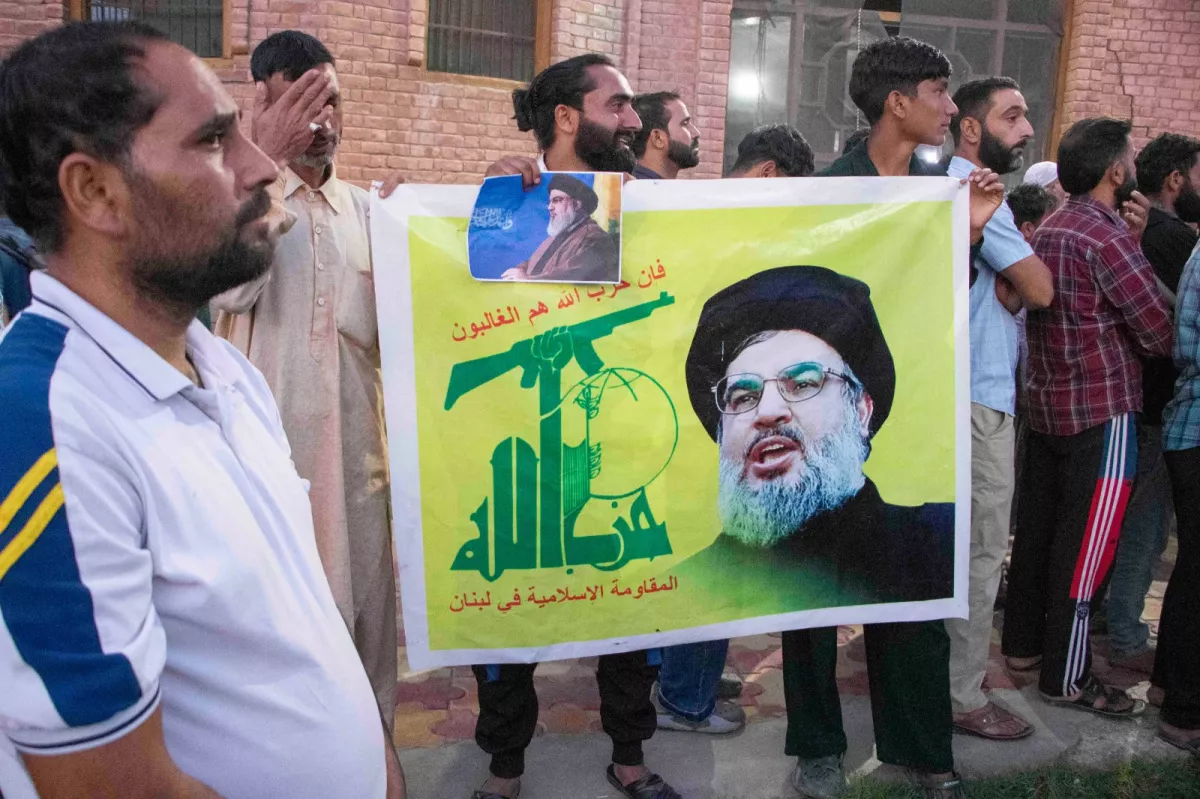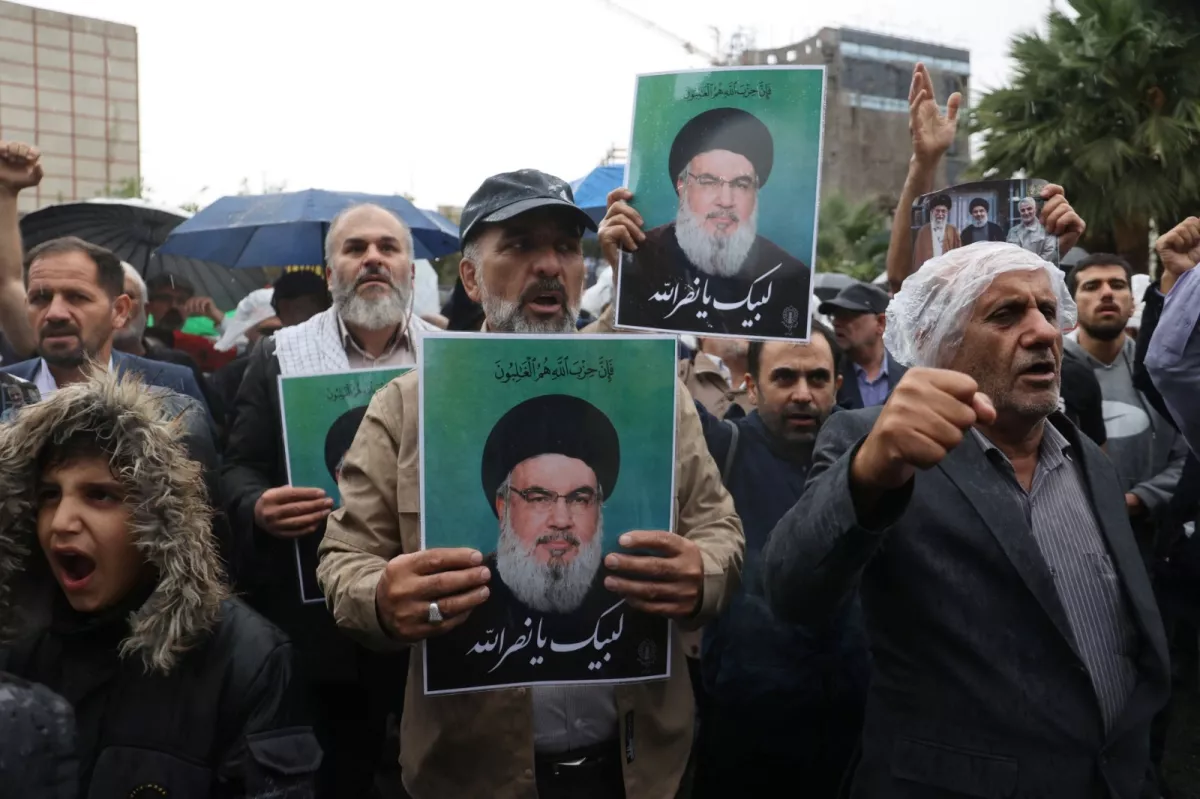How Nasrallah cemented Hezbollah's position as Iran's premier proxy? The end of an era
Hassan Nasrallah, secretary general of Lebanon's Hezbollah, was killed in an Israeli air strike on September 27. In 30 years, he had transformed Hezbollah into a powerful organization entrusted by Iran with a crucial mission. It is unlikely that a successor will be able to replace him.
Hassan Nasrallah has been Hezbollah's permanent leader for more than 30 years. In all that time, there has been no attempt to remove him from his position, which in itself speaks volumes about his influence. Throughout this time, Nasrallah has strengthened his party's position in Lebanon and, at the same time, his own position within Hezbollah. He handpicked top military and administrative leaders so that they fit his vision of the situation while simultaneously failing to challenge his autocratic authority. Many of them have been killed by Israel in recent months, including almost all of the group's top military leadership. This will no doubt weaken it.
During Nasrallah's 30-year rule, Hezbollah has become the most powerful non-state military actor in the world and the most influential military and political force in Lebanon, virtually taking over a country where no one dares to challenge it directly. With relatively weak support in society (12 seats out of 128 in parliament) and lacking the sympathy of even the majority of Shiites (they make up about 30-40 per cent of the population), Nasrallah has turned Hezbollah into a deep state with a controlling stake of power in Lebanon. The basis of this power is Hezbollah's superior military might over the Lebanese army, created primarily through Iranian support.
Najib Mikati, a multimillionaire and Sunni Muslim, is currently serving as the acting Prime Minister of Lebanon and is considered an ally of Hassan Nasrallah. The influential Christian party, the Free Patriotic Movement (FPM), is also his ally, along with the Shiite party Amal, although only about 40 percent of voters participate in elections in Lebanon. The leadership of Lebanon's main security agency, the General Security Directorate, which is seen as the central authority issuing orders to all security forces, is held by associates of Hezbollah.
This situation reflects the military dominance and financial resources of the group, which have expanded during Nasrallah's tenure. Hezbollah is not only the leading military and political force in Lebanon but also operates as a parallel state. With Iranian funding, it has established social support networks that cater to its loyal Shiite constituency, including free schools and hospitals. Additionally, Hezbollah owns a chain of supermarkets that offer inexpensive Iranian products at subsidized prices, as well as construction companies that collaborate with Iranian firms, taxi services, and much more.
These initiatives enable Hezbollah to gain support from a relatively small but significant segment of the population, from which it recruits new militants. Those who join Hezbollah receive competitive salaries by Lebanese standards.

During Hassan Nasrallah's leadership, Hezbollah has evolved into a transnational corporation involved in trading a wide range of minerals and substances. Amid Lebanon's severe economic crisis, Hezbollah has taken full or dominant control of a network of currency exchange operations. The group is designated as a terrorist organization by the United States and is subject to sanctions. However, by generating revenue through various means, it can conduct operations within the global financial system, often through associates, including many of its supporters and allies in Iran.
Nasrallah himself was a millionaire, and under his leadership, Hezbollah transformed into a capitalist corporation and a genuine business empire. In 2011, his personal fortune was estimated at $250 million, according to the Kuwaiti newspaper "As-Siyasa," citing a source in British intelligence. Meanwhile, the combined wealth of Hezbollah's leaders and associated Lebanese businessmen was reported to have reached up to $2 billion at that time. "This money is held in accounts registered under third-party names in Arab and Western banks," the publication noted. Hezbollah actively collaborates with a network of Lebanese entrepreneurs spread across the globe, playing a vital role within the vast Lebanese diaspora.
It was during Nasrallah's rule, as he became the true master of Lebanon, that Hezbollah emerged as a crucial component of the so-called "Axis of Resistance"—a coalition of armed militias and political parties loyal to Iran.
This coalition includes Iraq's ruling parties from the so-called Coordination Mechanism, pro-Iranian militias known as the Popular Mobilization Forces (PMF), Bashar al-Assad's regime in Syria, Hezbollah in Lebanon, Hamas in Palestine, and the Houthis, who control about a third of Yemen. Currently, this coalition largely (though not entirely) controls a group of countries forming a land corridor between Iran and the Mediterranean Sea—specifically Iraq, Syria, and Lebanon.
The new Iranian empire stretches from the borders of Afghanistan to the Lebanese capital of Beirut. It currently faces the American-Israeli coalition and is engaged in combat on five or six fronts, including Gaza (where clashes occur between the Israeli army and Hamas), the Lebanon-Israel border (where confrontations between the IDF and Hezbollah forces take place), Iraq and Syria (where pro-Iranian militants periodically attack American bases), and the Red Sea (where Yemeni Houthis target civilian vessels linked to Israel and American warships). This is a struggle for control or dominance over the Middle East.
Hezbollah, during Nasrallah's leadership, has played a crucial role—alongside Iran—in the establishment of the Axis of Resistance. It has assisted the Assad regime in maintaining power in Syria during the civil war, trained militants in Iraq and Yemen, and participated in suppressing mass social and political protests within Iran itself. Thus, Hezbollah is a key element of the Axis of Resistance beyond Iran's borders.
However, Hezbollah serves another crucial function for Tehran. It has become a key asset in Iran's strategy against Israel. The organization's missile and drone capabilities are substantial and have been developed by Iran to protect its nuclear and missile production programs. Israel has long declared Iran's attempts to develop nuclear weapons as a red line, and there is no doubt that, unlike Iran's red lines, the Israelis do not take such matters lightly—there is a very real threat involved.
To counter the possibility of massive attacks from the Israeli Air Force (the strongest in the region), Iran has heavily armed Hezbollah to ensure it can rain missiles down on Israel if necessary, thereby transforming the group into a deterrent factor. There is little doubt that it was Nasrallah who convinced the Iranians to invest in Hezbollah for this purpose.

This is the key reason why Iran and Hezbollah have been relatively restrained in their responses to Israeli strikes. Iran fears that in the event of a full-scale war between Hezbollah and Israel, the group would suffer significant losses and deplete its missile capabilities. In such a scenario, Tehran would be left without a deterrent mechanism to protect its nuclear program from Israeli attacks. Consequently, Iran's Supreme Leader, Ali Khamenei, has been careful to restrain Hezbollah, allowing it to gradually expand its strike capabilities against Israeli territory.
The potential successor to Hassan Nasrallah is Hashem Safieddin, who is Nasrallah's maternal cousin and maintains close ties with Iran, having undergone religious training in the holy city of Qom. His son is married to the daughter of General Qassem Soleimani, the commander of the Quds Force of the Islamic Revolutionary Guard Corps (IRGC), who was killed in a U.S. strike in Iraq in 2020. These close family connections illustrate the networking that has shaped careers within Hezbollah.
However, the leader who transformed Hezbollah into a powerful organization is no longer present, and the military cadres he relied on are also absent. The group has been weakened by Israeli attacks, and Hashem Safieddine has yet to demonstrate any significant achievements. Even if he were to become the leader, a reasonable question arises: how long could he survive in such conditions?








